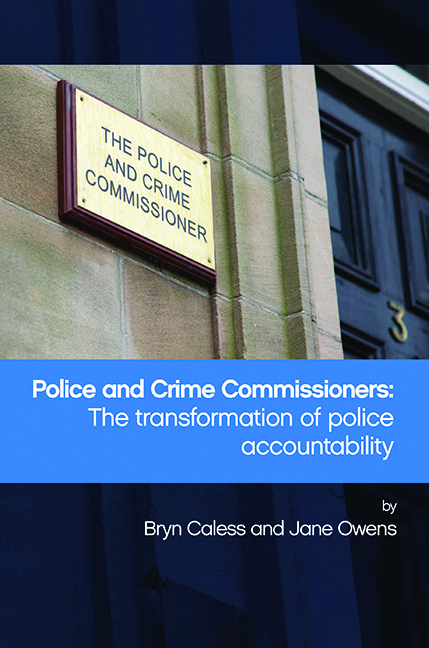Book contents
- Frontmatter
- Dedication
- Contents
- List of tables and figure
- Glossary of terms
- Acknowledgements
- Introduction
- one Governance: the Police and Crime Commissioner and police accountability in context
- two The psephology of the November 2012 election: motive, means and opportunity
- three Is the law on my side? Relationships between the PCC and the chief police officer team
- four Partners, colleagues or rivals for oversight? The (PCC) art of making friends and influencing people
- five “Putting yourself about”: PCCs, the media and the public
- six The debate with no end: PCCs’ remit and the problems of policing
- seven “I wonder if the game is worth the candle”: PCCs, their ‘work–life balance’ and their future
- General summary
- Bibliography
- Appendix Interview questionnaires
- Index
Introduction
Published online by Cambridge University Press: 01 September 2022
- Frontmatter
- Dedication
- Contents
- List of tables and figure
- Glossary of terms
- Acknowledgements
- Introduction
- one Governance: the Police and Crime Commissioner and police accountability in context
- two The psephology of the November 2012 election: motive, means and opportunity
- three Is the law on my side? Relationships between the PCC and the chief police officer team
- four Partners, colleagues or rivals for oversight? The (PCC) art of making friends and influencing people
- five “Putting yourself about”: PCCs, the media and the public
- six The debate with no end: PCCs’ remit and the problems of policing
- seven “I wonder if the game is worth the candle”: PCCs, their ‘work–life balance’ and their future
- General summary
- Bibliography
- Appendix Interview questionnaires
- Index
Summary
When the authors attended the Annual APCC Conference in Harrogate in November 2014, a delegate took Bryn Caless aside in a queue for coffee and told him that:
‘It's far too early to be studying PCCs; your research is premature. You should wait at least ten years before analysing things like this.’
There was no guarantee then (or now) that Police and Crime Commissioners (PCCs) would still be around in 2024, let alone either of the authors. Waiting ten years before undertaking research is a utopian prescription that bears very little resemblance to the real world, and none at all to the pragmatic level that the authors occupy. So we soldiered on regardless of the dire warnings of ‘prematurity’; progressively studying the nature of governance of the police; interviewing confidentially both PCCs and members of their chief police officer teams; and accumulating the ‘rich detail’ of our empirical research, the outcomes of which we present in this modest volume. And we discovered something interesting on the way: many police officers and PCCs have found common cause and have learned to work together quite well, despite doomsayers (plenty of whom are to be found in the pages that follow) who thought that introducing PCCs was the apocalyptic end of the policing world as we knew it. The doomsayers may have had a point four years or so earlier. When PCCs arrived at police headquarters all over England and Wales after the November 2012 elections, police forces generally, and the chief officer teams in particular, were largely hostile to, or at least wary of, these elected cuckoos that had been foisted on them, ousting the old comfortable Police Authority from the nest and demanding instead to be heard, fed and obeyed. Understandably, police forces did not welcome with open arms these insistent newcomers. For their part, the PCCs anticipated hostility or resistance, and most already knew, or thought they knew, what was wrong with policing and what they needed to do to put it right. There was some tightly-controlled aggression on their part too, especially when they encountered surly opposition or even mendacity from their police teams.
- Type
- Chapter
- Information
- Police and Crime CommissionersThe Transformation of Police Accountability, pp. 1 - 10Publisher: Bristol University PressPrint publication year: 2016



